This article is dedicated to the medical professionals on the front lines dealing with COVID-19 and all its ramifications for us personally and collectively.
When I first met Hassan Tetteh, M.D., M.B.A., we were preparing for his participation in the Maharishi International University (MIU) ChangeMakers event, Is College Bad for Your Brain? As the Command Surgeon and chief medical advisor for the National Defense University, we asked him to speak on the effects of stress in the college environment. On June 2, 2020, he also spoke with TM Talks: “What Lies Ahead? Dealing with a Drastically Changing World.”
I was struck by the professional depth of this man who is a renowned heart and lung transplant surgeon, Health Mission Chief at the U.S. Department of Defense for a new division integrating artificial intelligence into the medical field, U.S. Navy Captain, Associate Professor of Surgery at the Uniformed Services University of the Health Sciences, and thoracic (heart and lung) surgeon at Walter Reed National Military Medical Center.
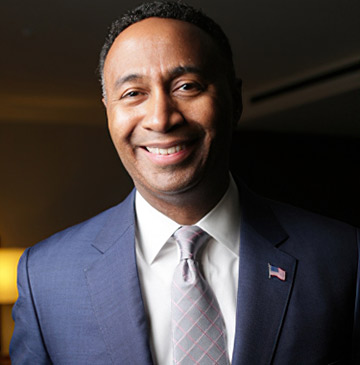
Dr. Hassan Tetteh is the Health Mission Chief at the U.S. Department of Defense, among other positions of teaching and service
A native of Brooklyn, New York, Dr. Tetteh is the best-selling author of four books—Gifts of the Heart, The Art of Human Care, Star Patrol, and Success Strategies—among many other achievements.
Yet with all these high-powered credentials, he exuded a deep sense of calm and a profound centeredness and humility. Dr. Tetteh told me the story of his personal transformation during his tours of duty as a field surgeon in Iraq and Afghanistan. He came back home struggling with the symptoms of post-traumatic stress (PTS), which served as a catalyst for him to learn the Transcendental Meditation (TM) technique.
The ensuing transformations expanded the profound sense of service that has become the hallmark of his life. Whether traveling all night to give someone a new heart, running a marathon to raise money for charity, or writing a new book, everything Hassan Tetteh does is imbued with the purpose of helping humankind.
After Dr. Tetteh’s participation in the MIU event, I wanted to learn more about his life and insights on caring for others. The following is an edited version of our conversation, which took place before the coronaviruspandemic struck. I spoke to him again recently, for an epilogue to our interview, when he shared his keys to empowering yourself during this time of COVID-19.
Whether traveling all night to give someone a new heart, running a marathon to raise money for charity, or writing a new book, everything Hassan Tetteh does is imbued with the of purpose of helping humankind.
Michael Sternfeld: Dr. Hassan Tetteh, you are an amazing human being on so many levels. In addition to all your professional roles, you’re also a husband and father of two beautiful kids. I have no idea how you do it all. Could you tell us what led you to add meditation to your life?
Dr. Hassan Tetteh: One of the great things I learned about meditation is that it gives you patience and the ability to step back and assess situations in a calm, collected way, especially with something that’s very critical, like a heart transplant. I came to appreciate that in a very tumultuous time in my life when I was deployed in Afghanistan.
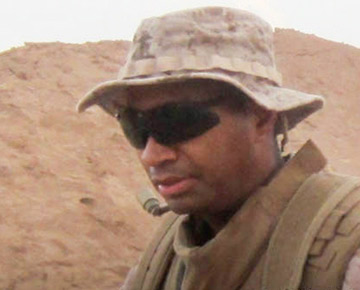
Dr. Hassan Tetteh was a combat surgeon embedded with the Marines in Afghanistan
I was embedded with the Marines as a combat trauma surgeon in very austere conditions. We were encamped in tents in a combat environment, hearing bombs and gunshots and artillery right outside where we were. Just the environment alone was enough to make most people pretty stressed-out. We saw quite a bit of trauma, with pretty devastating casualties coming in almost every day.
There were some periods in between these very stressful cases when we would have time to be on our own. During those times I would pray often, and I would also read. One of the books I really enjoyed was the Meditations of Marcus Aurelius, the great general and emperor of Rome just before its fall.
Here was a legendary leader who retreated to his tent in between battles to meditate, reflect, and write. I enjoyed reading how he would take himself away from all of the chaos that was going on outside and collect himself, and then return and be a better leader for it.
I found myself doing the same thing. We would take care of awful, almost inhumane injuries, and afterward I’d have to try to get back to some sort of peace and balance, which I did by emulating this great warrior and leader who meditated.
“We would take care of awful, almost inhumane injuries, and afterward I’d have to try to get back to some sort of peace and balance, which I did by emulating this great warrior and leader who meditated.” —Dr. Hassan Tetteh
Michael: How did this experience affect your transition back to civilian life?
Dr. Tetteh: When I got back home, I went through a very challenging transition due to the trauma I had experienced along with the nature of the work. Everybody comes back from something like that with some level of post-traumatic stress. A successful transition is when you can pick up where you were before you left and continue to be functional without succumbing to depression or a traumatic stress disorder. I had a successful transition because of three things.
One was the support and understanding of my family, which helped tremendously.
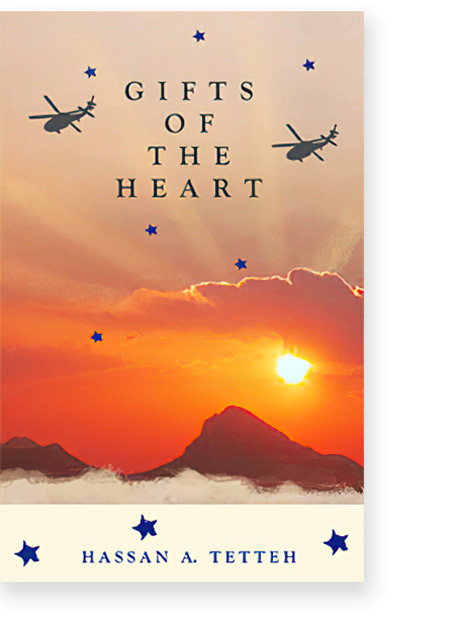
Dr. Tetteh’s novel is based on his deployment in Afghanistan as a physician and surgeon
The second was that I found a way to have something of a catharsis of the experience by writing about it. I’d developed a habit of journaling before I deployed, and that became an even more intense habit when I was out in my deployment. When I came home, I continued writing about my experience in the form of a fictional novel. It was tremendously helpful in accelerating my return to normalcy because I was releasing a lot of the stress and pent-up trauma that I had on the inside.
The third thing was meditation. Prior to my deployment, I had gone to a lecture given by Dr. Stuart Rothenberg at the University of Maryland in which he talked about the health benefits of the Transcendental Meditation technique. When I got back home, having been inspired by reading Marcus Aurelius, I wanted to learn more about meditation. Since I already had some familiarity with TM, I decided to explore that technique.
I discovered there was a TM Center in Bethesda, where I was stationed, and there I met Mario Orsatti, who became my TM instructor. I mentioned to him that I was writing a book and that I wanted to see if meditation would help with my reflections. I remember he said that meditation would help me be more creative. I think that was the thing that made me decide to learn TM.
These were the three things that worked collectively in my successful transition back to normalcy after a very difficult deployment—my family, writing the book, and meditation.
Michael: What personal benefits did you notice from your TM practice?
Dr. Tetteh: I noticed that meditation did help me with my writing. I was a lot more expressive emotionally in writing about my experience of dealing with the deployment. I was able to recall my experiences vividly and in great detail. Both of these aspects helped me greatly in releasing these experiences and their associated trauma.
I could also share with my family members and friends the things that I experienced. Because my thinking became a lot more clear from meditating, this also helped my relationships with my family.
And the other clear benefit was that I was more relaxed—less anxious and stressed. I had been a calm person even before I started meditating, but I think it made a significant difference, calming me even more.
Professionally, it also gave me a lot more situational awareness. I became more attuned with the things that were going on in the operating room. I attribute that partly to the big contrast between what I had been exposed to overseas and the calmer, more controlled kind of cases I was now doing. But also I now had this tool of the TM technique, which was giving me more clarity and sharpness of thought and a lot more presence when I was doing surgery.
“I now had this tool of the TM technique, which was giving me more clarity and sharpness of thought and a lot more presence when I was doing surgery.” —Dr. Hassan Tetteh
Michael: You use the term situational awareness, which is a strategic military term, also used in the corporate world. It is awareness that leaders, especially in the military, have of every level around them—where they are, where the opposition is, how their soldiers or team members are doing. A surgeon needs this as well. How has your TM practice increased this situational awareness?
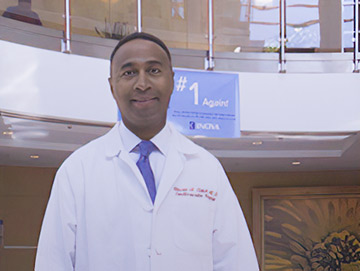
Dr. Hassan Tetteh, thoracic surgeon at Walter Reed National Military Medical Center
Dr. Tetteh: I’m not really sure how it happens, but I just know that when I meditate, I’m a lot more present and significantly more tuned in to my situation. I sense people’s emotions—for example, the nonverbal cues that people are giving, and knowing what my team or family members or even perfect strangers are feeling, without them saying anything.
I have a deeper appreciation of what’s going on around me. In business leader Ray Dalio’s book, Principles, he describes how when he practices TM, he feels like he’s a ninja, feeling everything that’s going on around him. Everything kind of slows down for him, and he can see and appreciate things in a much more profound way. That’s what I’ve experienced from meditating.
Michael: I’d like to switch gears to your work at the War College and later at NDU, the National Defense University. Not only have you been practicing the TM technique for about 10 years now, you’ve also been sharing it.
Dr. Tetteh: Let me step back, even before that—since you mentioned about sharing. I certainly was telling friends and family members I was practicing TM. I brought my son to an introductory session in Bethesda. He was a typical young kid—about eight or nine—always running around and being playful, and I thought that if he learned TM, he would be more calm when he had to do things that required focus, like studying.
To my surprise, he was really interested. That very same week, he took the course, and he’s been practicing TM ever since. This was my first experience of seeing someone that I’m close to derive significant benefit from TM. He actually wrote an essay about meditation, about how it gave him superpowers. I had given him Dr. Norman Rosenthal’s book about TM, Supermind.
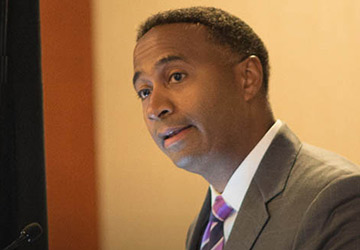
Dr. Tetteh is an associate professor of surgery as well as a well-known keynote speaker
Now shifting to the present. By the time I got to the War College, I had been practicing TM for many years. I was part of the Health and Fitness Directorate at the campus, so in addition to being the doctor on campus, I supervised a team of physical therapists and nutrition specialists.
The Director of the Health and Fitness Directorate was always trying to provide the students with every possible resource so they could be successful spiritually, mentally, physically, and emotionally. He was very receptive to anything that we could bring to the campus community that could help students in every aspect of their lives.
He had had people come and speak on different kinds of meditation, so I shared with him about the Transcendental Meditation technique and its benefits in my life. He had heard about it, and although he didn’t know much about it, he was interested. I suggested it would be great if he learned TM first, so he could speak to the students about it from first-hand experience.
So he learned TM, experienced immediate benefits, and decided that we should offer it to our students. For the very first introductory session, we booked a room that could accommodate 30 or 40 people, but so many people showed up, we were bursting at the seams, with people lined up in the hallway!
Since then, teaching the TM technique at the War College has become an enduring program, with the participation of many senior officers as well.
Michael: There is an epidemic of stress on college campuses across the country. The National War College is not only a regular academic environment, but the program also includes military training and boot camp, so there’s the potential for double the stress. How did you see the practice of TM affecting students?
Dr. Tetteh: I think TM practice enhanced their experience tremendously. This has been borne out, through testing and through video interviews, that TM benefited them physically and emotionally, and enhanced their academic and professional lives during their time on campus.
There are very few interventions that you can do in health care that don’t have side effects. You always have this trade-off with treatments like medication, and sometimes the side effects can be worse than the illness you’re trying to treat. That’s why we don’t have very good compliance with a lot of things we give to our patients.
With the TM technique, we have a tool that can help people be happier and healthier with very few, if any, side effects. I suppose you can be too relaxed, but that’s not a bad thing! I think that’s why it’s so well-received, especially when someone has tried other treatments.
And there are a number of good studies as well as much anecdotal evidence that show that it’s helpful in reducing traumatic stress disorders across many different types of experience—military, law enforcement, inner cities, and so on—and I’ve witnessed that first-hand.
“With the TM technique, we have a tool that can help people be happier and healthier with very few, if any, side effects. I suppose you can be too relaxed, but that’s not a bad thing!” —Dr. Hassan Tetteh
Editor’s note: See “Department of Defense–Funded Study Shows TM Technique Significantly Reduces PTSD Symptoms in Veterans” and “14 Studies Show TM to Be an Effective First-Line Treatment for PTSD” for more information.
Michael: In your experience as a student at National War College and also as a doctor, how would you assess the value of the TM technique for helping with the high pressure and stresses of both student life and military life?
Dr. Tetteh: Well, I think it helps in a number of ways. In fact, I wrote about this when I received an invitation to be a guest author on a book called 1 Habit: 100 Words from the Happiest Achievers, compiled and edited by Steven Samblis. He invited 100 people whom he identified as successful and happy individuals to participate. Each of us were asked to share one habit that we thought contributed to our success and happiness, and I chose daily meditation.
I talked about this healthy, effective, happy effect. If you meditate daily, it’ll help you to be healthier, because meditation—TM in particular—has been shown to reduce blood pressure, help with stress, lower anxiety, and help you emotionally. When you’re debilitated and not feeling well, it’s very unlikely that you can do your job, be a good parent, or be an effective leader.
When you’re healthy, then you can optimize what it is that you’re put on the planet to be; you can contribute. And when you’re healthy, and you’re effective in your work, you’re likely to be happy because you’re fulfilling your purpose.
So that’s a kind of construct that I talked about—that healthy, effective, happy construct.
Michael: I believe you gave that an acronym.
Dr. Tetteh: Yes… HEH.
“When you’re healthy, then you can optimize what it is that you’re put on the planet to be; you can contribute. And when you’re healthy, and you’re effective in your work, you’re likely to be happy because you’re fulfilling your purpose.” —Dr. Hassan Tetteh
Michael: I remember when we met up in Washington, D.C. You’d been up all night doing a heart transplant, and there was a beautiful, open quality about you. I asked you, “What does it feel like, not only to save someone’s life, but to give them a new heart?”
Dr. Tetteh: It’s extremely rewarding and makes you feel like you did something really impactful and powerful. I feel immensely grateful that I have the opportunity to contribute in such a meaningful way to someone’s life in perhaps one of their greatest times of need. And I also recognize that it’s not my act alone; it’s a team effort by a number of individuals, and to be a part of that is just incredibly rewarding.
It also makes one appreciate every moment of one’s life, and probably in a more visceral way than in many other medical specialties. You have the organ donors who have gone through some unfortunate trauma and have become brain-dead, and on the other side you have a patient with a failing heart or lung, and without this new organ, they’re going to die. So you have this stark contrast between life and death, and you’re witnessing it on a fairly regular basis.
Michael: That’s an amazing insight. Maybe I’m romanticizing it, but it’s just hard to fathom…
Dr. Tetteh: No, I think you’re absolutely right—I romanticize it every day. I write about it; I journal every day. It’s an emotional high that’s hard to describe.
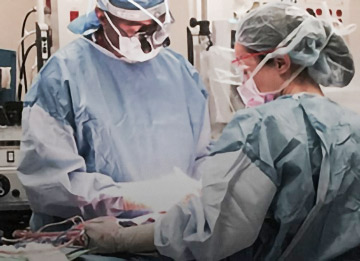
Dr. Hassan Tetteh, performing a transplant
When you saw me that morning, I was very tired, but at the same time I was so happy and on this emotional high because I helped somebody live. They’re going to hopefully have many years on this earth, and they’re going to be able to go raise kids and see grandkids, and teach, and lead, and develop, and create, and do many other cool things in this world. I was able to be a part of that.
It also makes me realize—don’t waste a moment of life. The person that donated that heart probably thought they had their whole life ahead of them as well, and then unfortunately something happened that they were not planning.
For example, it was a bit of a stretch to keep my breakfast appointment with you after being up all night, but my attitude was, “This is great to have an opportunity to go talk to Michael and tell him about this experience and how it might impact him.” I thought, “Let’s go do that because who knows? Maybe tomorrow neither one of us will be here.”
Michael: I love that—make the best of every moment of your life. So we’ve covered how you found the TM technique, and its impact on you professionally, as a student, as a military man, as an educator, and as a father—you’ve covered it all. Any last thoughts or feelings you want to express here?
Dr. Tetteh: One of the things that is always a pervasive thought within me is gratitude. I notice that as I’m going into or coming out of meditation, I often remember being grateful for things I have—my relationships, health, and all those things—as well as things that are coming into my life, things that are yet to materialize.
And if meditation has done nothing else for me, it’s given me the opportunity to be reminded of those things I have and to be grateful for them. For those who have not meditated before and are trying to figure out if it’s the right thing to do—if it does nothing else than to give you the opportunity to just stop for a moment in this busy world and reflect on what you have and what you can be grateful for, then I think it is worth its weight in gold.
Michael: That to me sounds like a beautiful ending because what you’ve just described here, Dr. Tetteh, sounds like a “cosmic situational awareness.”
“I often remember being grateful for things I have—my relationships, health, and all those things—as well as things that are coming into my life, things that are yet to materialize.” —Dr. Hassan Tetteh
Epilogue: Dr. Tetteh’s Advice to Empower Yourself During the Pandemic
For insight into our current health crisis, I spoke with Dr. Tetteh again after the coronavirus pandemic upended our lives. He shared a compassionate and illuminating perspective on our collective situation, tempered by the loss of several of his dear aunts and uncles in New York City due to COVID-19. He underscored that the pandemic numbers should be more than just statistics to all of us, as each case has a backstory of personal triumph and sometimes tragedy.
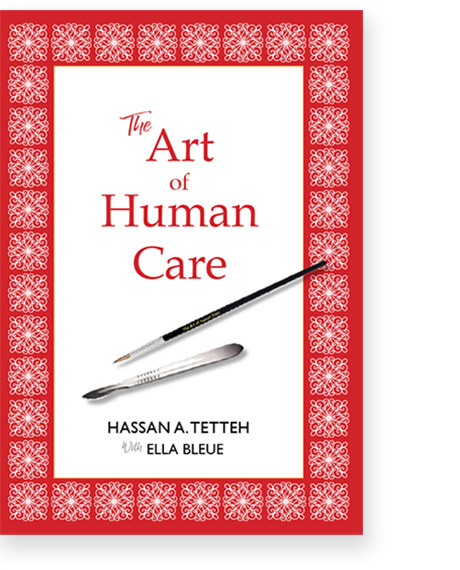
Dr. Tetteh’s most recent book addresses how we can change the world through healing
I asked him how he and his fellow medical professionals were handling the stress of the situation. He expressed concern that some people may experience a delayed PTS response, just as returning military personnel often exhibit delayed PTS from their experiences in combat. The overall uncertainty also contributes to our fears, he said.
To help fellow healthcare workers, Dr. Tetteh supports “Heal the Healers Now,” a new initiative to bring the TM technique to medical providers who are battling the coronavirus pandemic that has been launched by the Center for Health and Wellness of the David Lynch Foundation and the U.S. TM organization.
His personal and medical advice to counteract these effects was to find ways to empower yourself. He emphasized the importance of strengthening your personal resilience—mentally, physically, and spiritually.
The key, he said, is a good routine that incorporates regular meditation, in particular the TM technique, and exercise.
He described the importance of keeping your immune system resilient by minimizing stress in every way you can, including eating well and sleeping well.
And finally, he highlighted the significance of gratitude in this process—the importance of appreciating every moment and being grateful for the health that you have. “I am still here. I am still alive. And I’m grateful that I can help others.”
“I am still here. I am still alive. And I’m grateful that I can help others.” —Dr. Hassan Tetteh
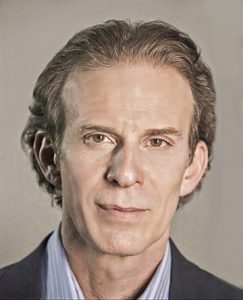
Michael Sternfeld is a producer/director with over 400 productions to his credit. He is currently an Event Producer for the David Lynch Foundation, on assignment to create special programs of national interest for Maharishi International University.

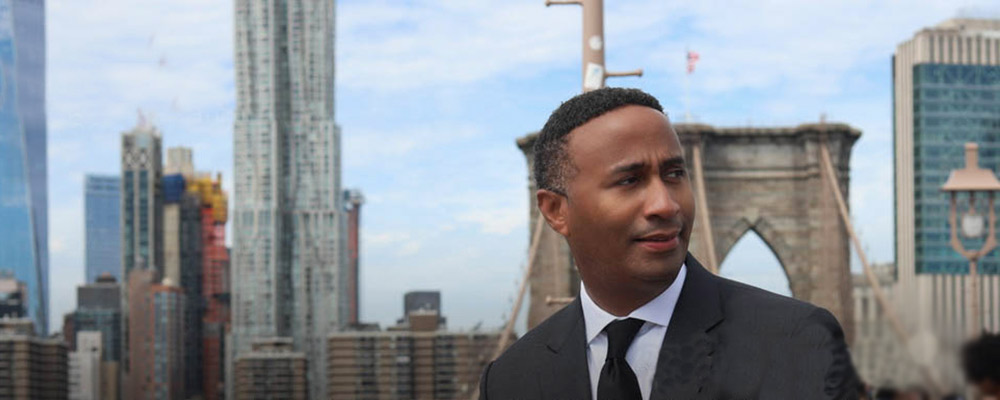
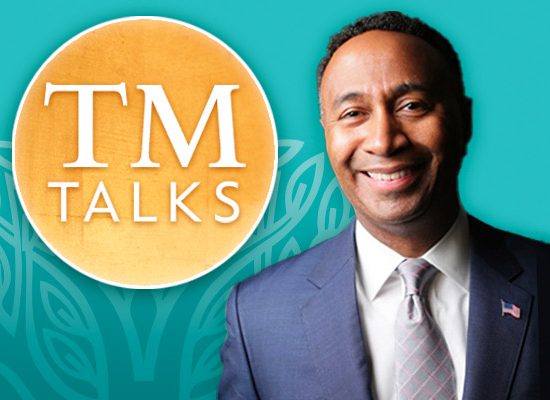
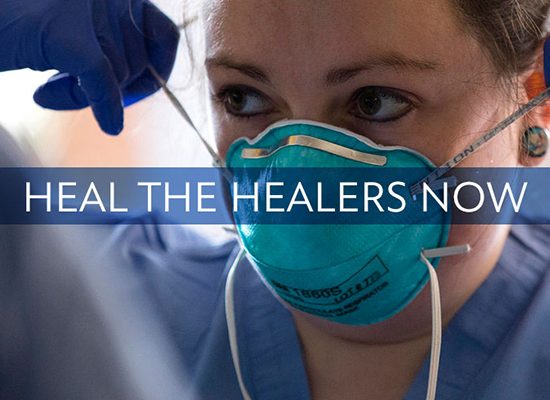
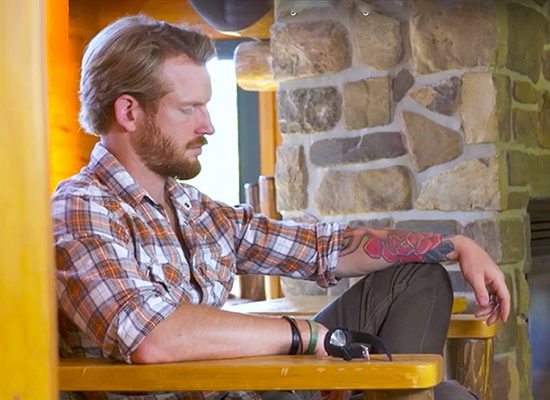
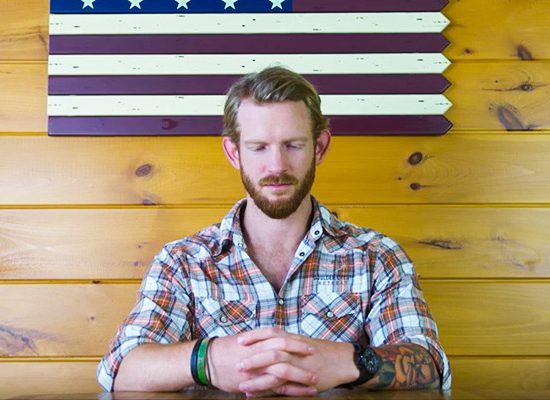
Exceptional interview! Thank you.
We are teaching CDN Veterans TM with a Veterans Affairs Canada grant and it’s extremely rewarding to help these men and women with PTSD who have given so much of themselves to help others. I will share this story with them all.
So great to hear you continuing this work and that the story inspired you to share with the veterans whom you serve.
Every veteran that we help with PTSD has a ripple effect creating a positive flow in society rather than a negative one. Thank you for your service.
I learned TM during my divorce. I immediatly regained my overview and equilibrium. So my husband and sons learned TM too. We divorced in complete solidarity and mutual support.
Hi Ursula, it’s so good to hear from you… it’s been so long since we were students together at MIU! And I’m also very glad to hear that TM has been such a source of solidarity and support for you and your whole family. Stay well!